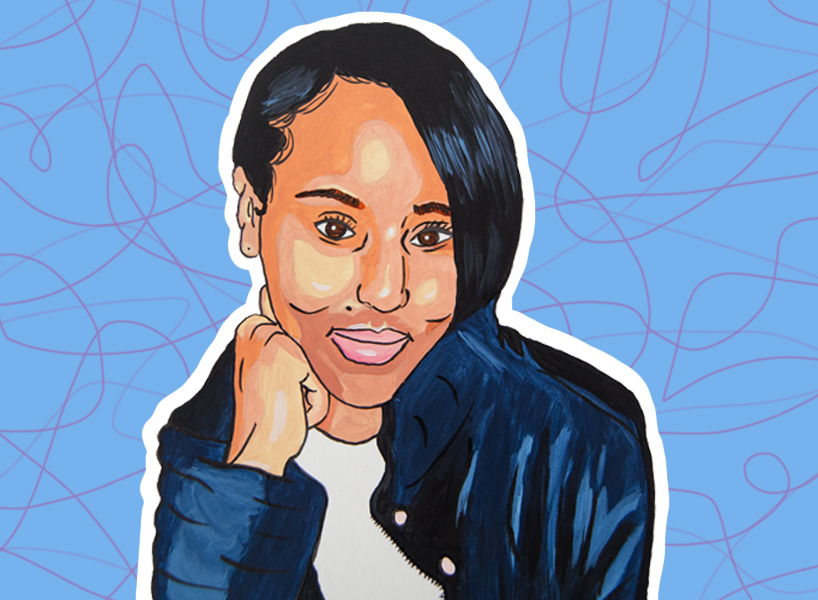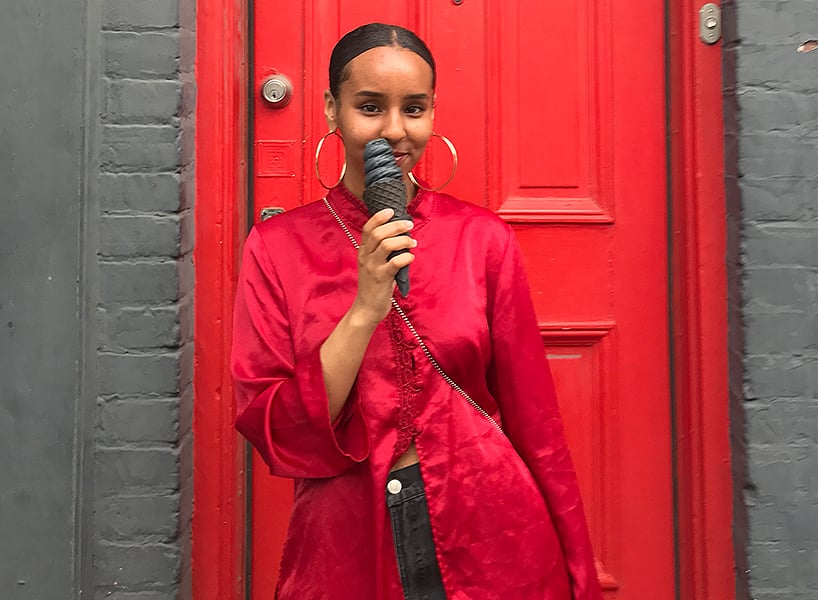It’s Tough Being Black on Tinder, But I’m Not Giving Up

As I waited for my Tinder date to arrive, I got deeper and deeper into his social media. Sitting at the bar of a dimly-lit Toronto restaurant, I swiped through his Facebook photos to see a) if any of his girlfriends had mysteriously died or vanished à la Joe Goldberg or b) if any of them were Black.
This was my first date since my first big breakup.
Before my ex and I began our two-year courtship, I bounced from situationship to situationship without any real attachment to anyone I was dating. Since I’m still at the dawn of my twenties, I didn’t have a problem with that. But after falling in love with my ex, I experienced the intensity of my first serious relationship and endured the pain of my first breakup. Once we had parted ways, I longed for something casual again. So shortly after we broke up, I downloaded Tinder.
Once I got to swiping, I was reminded that casual didn’t mean simple. I had grown accustomed to the ease of being boo’d up; the routine and rhythm that comes with knowing someone so well. Naturally, being on a date with a complete stranger, like the one I was waiting for at that downtown restaurant, was an adjustment.
By the time my Tinder date, a regular-shmegular Bay Street bro, sauntered in, my social media research confirmed that he had never dated a Black girl before. (Whether or not his ex was dead was inconclusive, but I digressed.)
My suspicions aside, we chatted about our respective upbringings, interests, first jobs and last relationships over cocktails. Everything was going well until my date went from talking about previous relationships to mansplaining why historically Black colleges and universities were racist, and lamenting that there aren’t enough white dancehall artists.
Having to explain why these were both problematic takes would have been tedious and telling of our different backgrounds. I would have gone from being his date to being his Black culture concierge. I was also way too drunk to properly rebut. But I wasn’t drunk enough to forgive or forget his ignorant and annoying perspectives.
I spent the entire Uber ride home swiping left and right on new guys.
This was just one of the sobering experiences that made me realize that as a Black woman, Tinder had all the same issues I face walking through the world, just on a smaller screen. This manifests in many ways, from harsh stereotyping to hypersexualization and the policing of our appearance. From my experience, being a Black woman on Tinder means that with each swipe I’m more likely to encounter veiled and overt displays of anti-blackness and misogyny.
This isn’t a new revelation. Two years ago, lawyer and PhD candidate Hadiya Roderique shared her experiences with online dating in The Walrus. She even took pretty drastic measures to explore if being white would impact her experience; it did.
“Online dating dehumanizes me and other people of colour,” Roderique concluded. After editing her photos to make her skin white, while leaving all of her features and profile details intact, she concluded that online dating is skin deep. “My features were not the problem,” she wrote, “rather, it was the colour of my skin.”

With that in mind, I’m ashamed to admit it, but to some degree I tailored my Tinder persona to fit into the mould of eurocentric beauty standards in order to optimize my matches. For instance, I was wary of posting photos with my natural hair out, especially as my main pic. This wasn’t out of self-hate; I love my hair. In fact, I love all of my features. But from growing up in a predominantly white area and having my hair, skin and culture under constant scrutiny, I knew that not everyone would.
A 2018 study at Cornell addressed racial bias in dating apps. “Intimacy is very private, and rightly so,” lead author Jevan Hutson told the Cornell Chronicle, “but our private lives have impacts on larger socioeconomic patterns that are systemic.”
The Cornell study found that Black singles are 10 times more likely to message white singles on dating apps than vice versa.
I didn’t have any white Tinder-using friends to compare matches with, but with the matches that I did receive, I had to consider whether or not each guy genuinely wanted to get to know me or had only swiped right because I was Black, hoping to fulfill a fetish or fantasy.
One such instance happened when I met with a guy at a west-end bar and we had a really dreamy date. But afterwards, when I did a thorough Insta-stalk, I was kind of weirded out to find that there were more than a dozen photos of scantily-clad Black women on his page, clearly sourced from Google or Tumblr.
It’s hard to articulate why this made me uncomfortable but this feeling was hard to shake. I didn’t want to totally write him off for his strange Insta-shrine but I couldn’t get over how uncomfortable it made me feel. It’s as if I had instantly been reduced to an instrument for sex, rather than a multi-dimensional person.
In other online dating experiences, my blackness was reduced to a pickup line. One match’s greeting was simply “BLM.” I wondered, had the acronym for Black Lives Matter already been coopted? Urban Dictionary didn’t help.
“Black Lives Matter?” I asked.
“Ya,” he responded. “That ass matters too :)”
I unmatched swiftly.
Even when the interactions were funny like this one, after a while, it was draining that every right swipe turned into a dead end. I eventually deleted the app after one match spiralled into incessant and aggressive texts and phone calls.
While my pseudo-stalker scared me off of the app, he didn’t discourage me from love altogether. I didn’t find my next partner on Tinder but I’m still hopeful that somewhere in the real world, my next match awaits. More than anything, at 21, I am way too young to be discouraged from dating. I owe it to myself to stay optimistic in spite of all of the disappointing dates that I have been on and all of the research and data that is so focused on how hard it is for Black women to find love. I’m hopeful because I deserve to be.
Although I’m done swiping for now, I’m not discouraged. I know that I will find someone who loves all of me—not exclusively for, or in spite of—my Blackness.
Related:
The Case for Black Joy
Three Types of Guys I’ve Met Dating Online as a Single Trans Woman
Why Being Single Sucks: What No One Wants to Talk About
The post It’s Tough Being Black on Tinder, But I’m Not Giving Up appeared first on FASHION Magazine.
